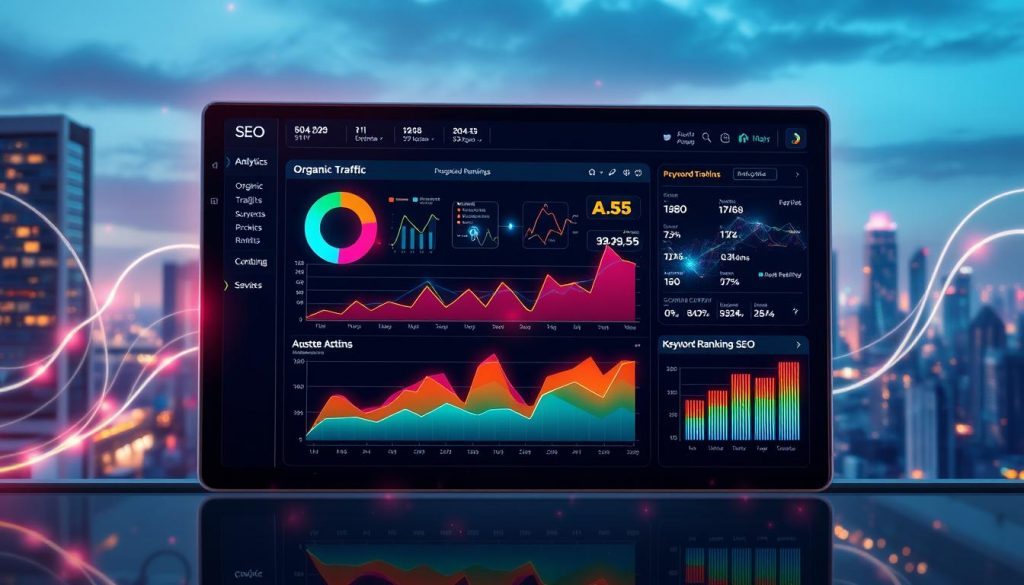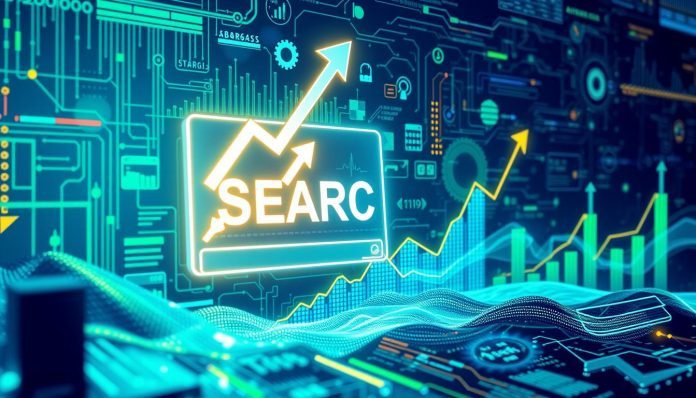Organic search brings in 53% of all website traffic, a 2019 BrightEdge study found1. Google, with over 8.5 billion searches daily, holds 91% of the global search engine market1. This shows how vital Search Engine Optimization (SEO) is. SEO helps search engines understand and index website content, making it easier for users to find.
Our aim is to rank high in search engine results for keywords our audience cares about. This brings more qualified visitors to our site.
The global SEO market is expected to hit $122.11 billion by 20281. This growth highlights SEO’s role in digital marketing. Whether you’re a brand, business, or organization, SEO can boost your online presence. It sets you up for long-term success.
Key Takeaways
- Organic search delivers 53% of all website traffic, making it a critical source of qualified leads.
- Google dominates the global search engine market, with over 8.5 billion searches conducted daily.
- The SEO industry is projected to reach $122.11 billion by 2028, underscoring its strategic importance.
- Effective SEO can help you rank higher in search results, driving more targeted traffic to your website.
- Optimizing your website for search engines is a long-term investment that can deliver sustainable results.
What is Search Engine Optimization?
Search Engine Optimization (SEO) makes websites more visible in search results2. It uses various techniques to attract search engines like Google. This drives more organic traffic and boosts online presence2.
Definition of SEO
SEO improves a website’s content and structure to rank higher in search results2. It helps businesses attract more leads and increase brand awareness. This leads to more conversions.
Importance of SEO in Digital Marketing
SEO is vital in digital marketing3. It’s key to a complete marketing strategy. It helps achieve goals like more website traffic and better brand reputation3.
SEO is better than paid ads because it builds long-term visibility. By optimizing content and structure, businesses can rank higher in search results2. This brings more visitors and builds trust with the audience.
In summary, SEO is essential for digital marketing3. It boosts online visibility, drives targeted traffic, and meets marketing goals3. Effective SEO strategies give companies a competitive edge and success.
How Search Engines Work
Search engines are key to the online world, helping us find what we need. At their heart are search engine crawlers, automated programs that explore the web. They find and add content to the search engine’s index4.
This indexing is the base for search engines to rank content. They organize and store information for quick access.
Crawling and Indexing
Search engine bots, or spiders, search the web by following links4. They add new pages to the search engine’s index. This index includes important details like keywords and how fresh the content is4.
But not every page is indexed. Some might be blocked by robots.txt files or have low-quality content4.
Ranking Algorithms
After indexing, search engines use complex algorithms to sort results4. These algorithms aim to show the most relevant and quality content. They consider many factors, like how well the page matches the query and its authority5.
Interestingly, how a page ranks can differ between search engines like Google and Bing for the same query4.
Knowing how search engines work is vital for businesses and individuals. It helps them improve their online presence and search rankings. By keeping up with crawling, indexing, and ranking updates, we can make sure our content is found and ranked well.
“Search engines aim to provide the most relevant and high-quality information to users, but the exact algorithms they use can vary.”
Key Components of SEO Strategy
Creating a good SEO strategy means using both on-page and off-page methods. Focus on content, technical SEO, and link building to boost your online presence. This helps attract more visitors to your site.
On-Page SEO Elements
On-page SEO makes each web page better for search engines and users. It includes using the right keywords, meta tags, and headers. Also, it’s about making your site easy to navigate6.
Remember, 38% of shoppers will leave if they don’t like the site’s design6.
Off-Page SEO Techniques
Off-page SEO builds your site’s authority through external actions. This means getting good backlinks and being active on social media. It shows search engines your site is trustworthy7.
Having a strong social media presence also helps your SEO. It shows search engines your site is influential8.
Combining on-page and off-page SEO makes your site more visible. This leads to better rankings, more visitors, and better results for your business.
| SEO Component | Key Strategies |
|---|---|
| On-Page SEO |
|
| Off-Page SEO |
|
“In 2024 and beyond, technical SEO is becoming more integrated into website and CMS functionalities, stressing the need for developers who get SEO7.
Using both on-page and off-page SEO builds a solid base for your digital marketing. It improves your site’s visibility and performance.
Keyword Research and Analysis
Starting a good SEO plan needs solid keyword research. Find out what your audience searches for. This way, you can make your content better and get more visitors to your site9.
Tools for Keyword Research
There are many keyword research tools like Google Keyword Planner, SEMrush, and Ahrefs. They help you find great keywords10. These tools give you info on how often people search, keyword difficulty, and what they’re looking for, helping you pick the best keywords11.
For instance, “paranormal investigators” gets 800 searches a month9. But “SEO tips for small businesses” gets 300 searches and is harder to rank for9. On the other hand, “cat detective agency” doesn’t get many searches, so it’s not a good choice9.
By looking at search volume and keyword difficulty, you can find the best keywords. Then, you can plan your content to match what your audience wants911.
Analyzing Keyword Competition
After finding long-tail keywords and knowing their search numbers and difficulty, it’s time to check the competition11. Look at the sites that rank well, their content quality, and their rankings11.
Knowing who you’re up against helps you create content that stands out. You might make topic clusters with main pages and detailed subtopics. This makes your site a go-to source for important topics11.
“Keyword research is the foundation of any successful SEO strategy. It allows you to understand your audience, create content that resonates, and ultimately, drive more relevant traffic to your website.”
Good keyword research and analysis are key to improving your online presence. Use the right keyword tools and study your competition. This way, you can make content that really speaks to your audience and shows real results91110.
The Role of Content in SEO
In the world of SEO, content is key to a good digital marketing plan. Quality, authoritative content12 helps websites rank better. It builds a strong bond between users, search engines, and websites. By making content for the right audience, businesses can get more visitors, become more trusted, and be more relevant online.
Creating High-Quality Content
Making great content is vital for SEO success. It should be easy to read, well-organized, and unique. Keeping content fresh13 shows a site is up-to-date and relevant. Search engines like sites that keep giving users new and useful info.
Content Formats That Rank Well
For content that ranks well, mix it up. Use in-depth articles, how-to guides, listicles, infographics, and videos14. A variety of content makes the site more interesting and helps with SEO.
Having a solid content marketing and content strategy is key. Use keyword research, user intent, and different content formats. This can really help businesses improve their content optimization and create engaging content for their audience.
“Content is king, but distribution is queen and she wears the pants.” – Joe Pulizzi, Founder of Content Marketing Institute
By knowing how important content is in SEO and always making high-quality, user-focused content, businesses can do great. They can get a lot of visibility and success online121314.
Technical SEO Explained
In the world of search engine optimization (SEO), technical aspects are key. They help drive website visibility and rankings. Technical SEO makes sure a website is easy for search engines to find and use1516.
Website Speed Optimization
Page load speed is very important for both users and search engines. Slow pages can hurt user experience and lead to more people leaving quickly15. To make pages load faster, you can use image compression, browser caching, and file minification15.
Mobile Friendliness and Responsive Design
Google now focuses on mobile versions of websites first. So, making sure your site works well on all devices is key15. Tools like PageSpeed Insights help check how fast and mobile-friendly your site is16.
Other important technical SEO steps include using structured data and having the right URL structure. Also, make sure your site is easy for search engines to crawl and index15. Submitting an XML sitemap helps search engines find your pages better15.
By focusing on these technical areas, businesses can make their sites easier to find and rank higher in search results16.

“Successful technical SEO requires a collaborative effort between SEO specialists and web developers to ensure the website’s technical foundation is optimized for search engine performance.”
Link Building Strategies
Backlinks are key in search engine optimization. They’ve been important for nearly 20 years. Google uses them to judge a webpage’s quality17. Anchor text also helps Google understand what a page is about17. To improve our sites, we need to learn how to get good backlinks.
Importance of Backlinks
Backlinks show search engines that your content is valuable. The site linking to you matters a lot for rankings17. Getting links from sites that are relevant to yours can make your site more credible.
Effective Link Building Techniques
Creating unique content, like research or infographics, can attract backlinks naturally17. List posts are also good at getting backlinks, studies show17. Guest posting and finding broken links can also get you quality backlinks.
Links in the main content are more valuable than those in footers or sidebars17. Search engines like links that are part of the content more than others17. Knowing the difference between nofollow and dofollow links is important for SEO17.
| Backlink Profile Metric | Importance |
|---|---|
| Backlink Volume | The more high-quality backlinks a website has, the better it can rank in search engines18. |
| Link Authority | Backlinks from authoritative, relevant websites carry more weight and can significantly boost a site’s search rankings18. |
| Anchor Text | Descriptive anchor text can positively influence a page’s perceived relevance for specific keywords18. |
| Link Attributes | Dofollow links are more valuable for SEO compared to nofollow, sponsored, or UGC links18. |
Using these strategies can improve our backlink profile and authority. It also helps drive more traffic to our site19.
Getting backlinks through great content is key. By making unique content, we can attract more backlinks and become leaders in our field19.
Measuring SEO Success
It’s key to track how well your SEO is doing. By looking at important metrics, we learn a lot about our site’s performance. This includes how many visitors we get, our ranking in search results, and how much we make back from our efforts.
Key Performance Indicators (KPIs)
We focus on a few main KPIs. These are organic traffic, search rankings, and how visible we are in search results. We also look at impressions, click-through rates, conversions, and bounce rates20.
Organic traffic shows us how many people visit our site from search engines20. Better rankings mean more people see our site20. Being visible in search results, like in featured snippets, helps our site stand out20.
Impressions tell us how often our site shows up in search results20. A good click-through rate means our titles and descriptions are drawing in users20. Conversions show us if people are taking the actions we want them to, like signing up or buying20. And bounce rate helps us see if our site is easy to use and engaging.
Tools for SEO Analytics
To keep an eye on these KPIs, we use tools like Google Analytics and Google Search Console21. We also use SEO software like SEMrush or Ahrefs21. Our goal is to get on the first page of search results to bring in more visitors21.
Being on the first page means more people click on our site21. A high bounce rate might mean we need to make our site easier to use and our content more relevant21. Seeing the same visitors come back is a sign we’re doing something right21. Google suggests keeping an eye on how our site compares to others to see how we’re doing21.
By watching these numbers and using what we learn, we can make our SEO better. We can improve our site and show others the value of our SEO work.

“Measurement is the first step that leads to control and eventually to improvement. If you can’t measure something, you can’t understand it. If you can’t understand it, you can’t control it. If you can’t control it, you can’t improve it.” – H. James Harrington
Future Trends in SEO
The digital world is always changing, and we need to keep up with the latest trends in Search Engine Optimization (SEO)22. In 2023, more marketers are using AI tools for SEO tasks. This shows how AI and machine learning are becoming more important in our field22. Yet, even with AI’s growth, human creativity and expertise in making content are just as vital22.
Voice Search Optimization
Voice search is becoming a big deal in SEO. As more people use voice-activated devices, making content for natural language queries is key23. We need to write content that answers questions directly and is engaging and trustworthy23.
AI and Machine Learning in SEO
22 The use of AI tools has led to more demand for senior writers, showing the value of human touch in content22. Also, recent algorithm updates focus more on who wrote the content, making it important to be seen as an expert23. We should aim to make content that shows our expertise and is seen as valuable by both users and search engines23.
24 With Google’s new AI-powered SERP snippets and advanced Language Learning Models, how we interact with search results will change a lot24. These changes might affect how often people click on organic pages, as Google tries to keep users within its system24.
FAQ
What is search engine optimization (SEO)?
Why is SEO important in digital marketing?
How do search engines work?
What are the key components of an SEO strategy?
How important is keyword research in SEO?
What role does content play in SEO?
What are the technical aspects of SEO?
How important are backlinks for SEO?
How do you measure the success of an SEO strategy?
What are the future trends in SEO?
Source Links
- What Is SEO – Search Engine Optimization? – https://searchengineland.com/guide/what-is-seo
- SEO Starter Guide: The Basics | Google Search Central | Documentation | Google for Developers – https://developers.google.com/search/docs/fundamentals/seo-starter-guide
- What is search engine optimization (SEO)? – https://www.optimizely.com/optimization-glossary/search-engine-optimization/
- How Do Search Engines Work? – https://www.lumar.io/learn/seo/search-engines/how-do-search-engines-work/
- How Do Search Engines Work? Beginner’s Guide – https://ahrefs.com/blog/how-do-search-engines-work/
- What Are the 4 Components of SEO? – https://www.demandjump.com/blog/what-are-the-4-components-of-seo
- 4 pillars of effective SEO – https://searchengineland.com/pillars-effective-seo-strategy-435823
- The 6 Basic Components Of A Strong SEO Strategy For Online Retailers – https://www.forbes.com/sites/theyec/2012/08/03/the-6-basic-components-of-a-strong-seo-strategy-for-online-retailers/
- How to Do Keyword Research for SEO: A Beginner’s Guide – https://blog.hubspot.com/marketing/how-to-do-keyword-research-ht
- The 4 best free keyword research tools in 2024 | Zapier – https://zapier.com/blog/best-keyword-research-tool/
- Keyword Research for SEO: What It Is & How to Do It – https://www.semrush.com/blog/keyword-research/
- Importance of Content in SEO: Why it Matters + How to Create it – https://www.semrush.com/blog/importance-content-seo/
- Why Is Content Important for SEO? (And How to Get Started) – https://www.seo.com/blog/why-is-content-important-for-seo/
- SEO and Content Marketing: An Essential Combo (Explained) – https://slickplan.com/blog/seo-and-content-marketing
- What Is Technical SEO? Basics and Best Practices – https://www.semrush.com/blog/technical-seo/
- What is technical SEO? – https://searchengineland.com/what-is-technical-seo-434963
- Link Building: The Definitive SEO Guide for 2024 – https://backlinko.com/link-building
- Link Building for SEO: A Guide to the Basics – https://www.semrush.com/blog/link-building/
- Link Building for SEO: The Beginner’s Guide – https://ahrefs.com/blog/link-building/
- SEO Results: How to Track & Measure SEO Performance – https://www.semrush.com/blog/seo-results/
- How to Measure the Success of Your SEO Strategy – https://www.benchmarkemail.com/blog/measure-success-seo-strategy/
- SEO Trends in 2024 and How to Adapt – https://backlinko.com/seo-this-year
- Leadfeeder | State of SEO in 2024: Trends and Predictions – https://www.leadfeeder.com/blog/state-of-seo/
- 17 New SEO Trends to Look for in 2025 – https://www.stanventures.com/blog/seo-trends/









